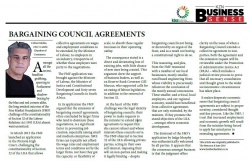Cobus Oelofse - Bargaining council agreements2016-06-21 Amongst all the recent, headline grabbing, sparring in Parliament and shadowboxing by the blue and red corners alike, the long awaited outcome of the Free Market Foundation's (FMF) challenge of the constitutionality of Section 32 of the Labour Relations Act 1995 (LRA) almost went unnoticed.
In March 2013 the FMF launched an application in the Pretoria High Court, challenging the constitutionality of Section 32 of the LRA that allows collective agreements on wages and employment conditions to be extended, by the Minister of Labour, to employers in an industry, irrespective of whether these employers were party to the negotiations. The FMF application was brought against the Minister of Labour, the Minister of Justice and Constitutional Development and forty seven Bargaining Councils in South Africa. In its application the FMF argued that the extension of bargaining council agreements, often concluded by larger firms who tend to dominate these negotiations, is a significant factor in preventing job creation, especially among small and medium enterprises. SME firms can typically not afford the wage rates and employment terms and conditions set by the larger firms, nor have they got the capacity, or flexibility of scale, to absorb these regular increases in their operating outlay. The consequence stated is a direct and devastating loss of existing jobs, with little chance of new ones being created. This argument drew the support of business leaders, as well as ex-Reserve Bank Governor Gill Marcus, who supported calls for an easing of labour legislation, in addition to the removal of Section 32. At the heart of the FMF challenge was the legal identity of bargaining councils, their power to make requests to the minister to extend main agreements (a request that she cannot refuse) and whose interests these councils serve. The FMF objected to Section 32 of the LRA allowing private parties, acting in their own self-interest, imposing their will on non-parties and making it legally binding - despite bargaining councils not being, or directed by an organ of the State, and as a result not having a constitutional right to do so. This reasoning, and plea, from the FMF resonated with a number of our local businesses; mostly smaller, rural based engineering firms whose viability is precariously reliant on the conclusion of the mostly annual concessions. These smaller, and critical, local employers, and our regional economy, would have benefitted from collective agreements that are only extended, by the minister, if they promote the stated objectives of the LRA - amongst others economic development. The dismissal of the FMF's application by Judge Murphy was enthusiastically welcomed by all parties. It appears that the consensus amongst business is that the judgment offers clarity on the issue of when a Bargaining Council extends a collective agreement to nonparties, both the agreement and the extension request will be reviewable under the Promotion of Administrative Justice Act (PAJA) - which includes a judicial review process to prove that all necessary consultation and thought given to the wider socioeconomic circumstances has taken place. It makes desperate economic sense that bargaining council agreements are subject to proper scrutiny, considered thought and due process. Like the FMF, I trust that increased employment and economic growth will result from the minister being forced to apply her mind prior to extending agreements. This article was originally published in The Mercury, 8 June 2016 www.ilembechamber.co.za |
Cobus Oelofse - Bargaining council agreements
Copyright © 2026 KwaZulu-Natal Top Business
